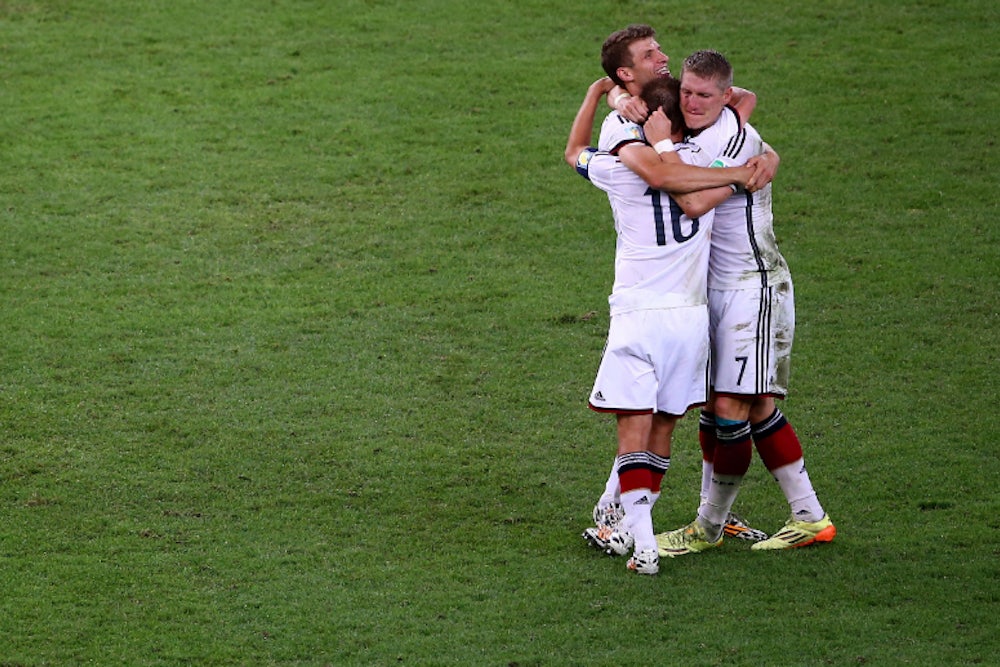Vladimir Putin loomed at the center of the Maracanã today. And in a way, he’s loomed over this whole past month of soccer. Russia will host the next tournament and then Qatar the one after that, and there was always the unspoken sense that this was the last of the great World Cups—a moment of relative innocence before the fall. Yes, the Brazilians spent millions padding the pockets of cronies. But all the Brazilian misdeeds will dim when compared with what's to come: the grotesque spectacles of preening authoritarian regimes.
This World Cup began with an unusually robust sense of openness and optimism. Underdogs like Costa Rica stuck it to the European powers. The prevailing style of play reflected a buried side of human nature—it was affirmative, almost joyous, with a record number of goals in the Group Stage and a minimal dose of cynical tactics. Despite the saturation coverage beamed by the Internet and satellite television, there was the recovered thrill of discovery, most notably James Rodriguez but also players like Guillermo Ochoa, Andre Schurrle, Joel Campbell, and Juan Guillermo Cuardado. If this was going to be the last great World Cup, it was going to be one worthy of the moment.
But after the gaudy display of the Group Stages, the shortcomings of this tournament were exposed soon enough. The 2014 World Cup lacked a historically great team and the goals dried up. Brazil’s collapse was psychologically fascinating, but also heartbreaking. For fifty years, Brazil represented an ideal of soccer, practicing a style that was (perhaps naively) celebrated for its purity and beauty. The collapse of that ideal might have been a long time coming, but to watch it crumble in such graphic, horrific fashion felt like a blow against idealism itself.
When the tournament began, I picked Argentina. My reasoning for that selection turned out to be wrong. I had thought that they had discovered an offensive formula that would yield many goals—and that Messi would produce a performance that would inscribe his place in the canon of greats. But Argentina advanced to the finals on the basis of its defense, which played with a stoutness that almost nobody foresaw. Messi scored a couple of great goals, but the team was dependent on Javier Mascherano’s impeccable tackles. And for long stretches, Messi disappeared from games. He played with physical and psychic fatigue; he was not nearly involved enough to carry his team. In the final, he missed two chances that he would have normally easily filed in his cabinet of goals. Perhaps, this tournament would have gone differently if Angel Di Maria hadn’t torn his thigh muscle. But without the distracting threat of Di Maria, defenders had the liberty to hang on Messi’s shorts; the unbearable pressure on Messi became even more unbearable.
Germany was a plenty likable victor and there's no case to be made that any other team deserved the trophy more. They played with a style that reflected the best moments of the tournament. But it’s hard to get too carried away describing their glories. In retrospect, the Germans shredded Brazil because Brazil was emotionally primed to implode. Despite a roster filled with excellent players, Germany doesn’t have anything close to a transcendent player. (Neuer, at goalkeeper, is the only player who comes close.) And there’s nothing paradigm-shaking about the German style of play. The fourth German World Cup will likely be remembered much like the past three—the triumph of a great system and a team that doesn’t squander its chances.
So, it’s on to Russia and Qatar. Who can say what the geopolitical situation will resemble four years from now, let alone eight? But let me hazard a not-terribly adventurous guess. Compared to the joyousness of this past month, the mood will be grim. The next World Cups will be far more freighted with moral concerns—part of the the long awaited reckoning with the evils of FIFA and its benefactors. Further, it’s hard to imagine that the game will maintain its current offensive mindset. The factors that conspire to create an environment hospitable to attacking soccer rarely last for long. An inevitable dark age is around the corner and the memories from this tournament will need to sustain us.
